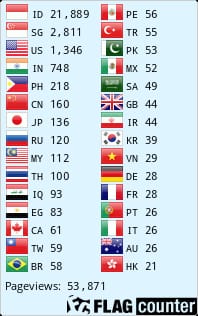Antibacterial Effect of Semendo Coffee Beans (Coffea Canephora) Extract Against Streptococcus Sanguinis In Vitro Growth
DOI:
https://doi.org/10.30649/denta.v15i1.1Keywords:
Semendo coffee beans, Streptococcus sanguinis.Abstract
Background: Streptococcus sanguinis is one of the most dominant bacteria in early colonization of plaque formation. Robusta coffee beans (Coffea canephora) was reported to have antibacterial properties because it contained compounds such as alkaloids, flavonoids, saponins, tannins, and steroids. Purpose: This study aimed to determine the antibacterial effect of Semendo coffee beans extract to inhibit the bacterial growth of S. sanguinis. Material and method: This study was an in vitro experimental laboratory. This study used Robusta coffee beans origins from South Sumatera called Semendo coffee beans. The treatment group used Semendo coffee beans extract with concentrations of 2.5%, 5%, 10%, 20%, and 40%. The positive control used 0,2% chlorhexidine gluconate and the negative control used sterile distilled water. The antibacterial potency test was used dilution method to MIC (Minimum Inhibitory Concentration) and MBC (Minimum Bactericidal Concentration) test, and disk diffusion method to inhibitory zone test. Result: The result showed that the MIC of Semendo coffee beans against S. sanguinis couldn't be determined because it was blocked by the color of the extract while MBC was 5%. The average diameter of the inhibition zone formed on 2.5% Semendo coffee beans extract was 12,0±0,4082 mm and bigger along with higher concentration. These results suggested that the extract of Semendo coffee had an antibacterial effect against the growth of S. sanguinis on 2,5%-40%.
Downloads
References
Okahashi N, Nakata M, Terao Y. Pili of oral Streptococcus sanguinis bind to salivary amylase and promote the biofilm formation. Microbial pathogenesis. 2011; 50: 148-154
Rezki S, Pawarti. Pengaruh pH plak terhadap angka kebersihan gigi dan angka karies gigi anak di klinik pelayanan asuhan polteknes Pontianak tahun 2013. ODONTO Dental Journal. 2014; 1(2): 13-18
Subekti A, Ningtyas E, Benyamin B. Hubungan plak gigi, laju aliran saliva, dan viskositas saliva pada anak usia 6-9 tahun. Jurnal Kesehatan Gigi. 2019; 6: 72-75
Balitbang Kemenkes RI. Laporan nasional RISKESDAS 2018. Jakarta: Lembaga Penerbit Badan Penelitian dan Pengembangan Kesehatan (LPB); 2019.
Pertiwi F, Firdaus I, Erlita I. Comparison of inhibitory activity of kelakai leaf extract and 0,2% chlorhexidine glucona against Streptococcus sanguinis ATCC 10556. Dentino Jurnal Kedokteran Gigi. 2019; 4(2): 145-150
Zhu B, Macleod L, Kitten T, Xu P. Streptococcus sanguinis biofilm formation & interaction with oral pathogens. Future Microbiol. 2018; 13(8): 915-32
Bagavad G, Chandrasekaran S, Dhivyadarshani D, Gnanamani A. Gram-positive anaerobes in periodontal Ppathogenesis: new kids on the block?- A mini review. J Bacteriol Mycol. 2016; 3(1):1-7
Maheswari R. Daya hambat ekstrak biji kopi robusta (Coffea canephora) terhadap pertumbuhan bakteri plak. Universitas Airlangga. 2015; 16-20
Jepsen K, Jepsen S. Antibiotic/antimicrobials: Systemic and local administration in the therapy of mild to moderate advanced periodontitis. Periodontology 2000. 2016; 71: 82-112
Bustanussalam. Pemanfaatan obat tradisional (herbal) sebagai obat alternatif. Pusat Penelitian Bioteknologi. BioTrends. 2016; 7(1): 20-5
Abdallah E. Preliminary screening for antibacterial activitiy of Coffea arabica beans (roasted and unroasted) against different pathogens. Journal of Biotechnology and Biosafety. 2018; 6(1): 532-7
Wigati E, Pratiwi E, Nissa T, Utami N. Uji karakteristik fitokimia dan aktivitas antioksidan kopi Robusta (Coffea canephora Pierre) dari Bogor, Bandung, dan Garut dengan metode DPPH (1,1-diphenyl-2-picrylhydrazyl). Fitofarmaka Jurnal Ilmiah Farmasi. 2018; 8(1): 58-66
Wijaya W, Ridwan R, Budi H. Antibacterial ability of arabica (Coffea arabica) and robusta (Coffea canephora) coffee extract on Lactobacillus acidophilus. Dent J. 2016; 49(2): 99-103
Advertorial. Nikmati cita rasa kopi semendo, yuk!. Sumsel: Tribun News. 6 Maret 2015; Diakses tanggal 23 September 2019. Terdapat pada: www.pemprovsumsel.tribunnews.com
Badan Pusat Statistik Kabupaten Muara Enim. Kabupaten Muara Enim dalam angka. Muara Enim: CV. Vika Jaya; 2016: 251
Urban Id. Lima pilihan kopi robusta khas ‘bumi sriwijaya’, Sumatera Selatan. Kumparan. 22 Juni 2019; Diakses tanggal 23 September 2019. Terdapat pada: www.kumparan.com
Trisharyanti I, Febrian R. Skrining aktivita antibakteri ekstrak etanol daun terhadap Salmonella typhi resisten kloramfenikol. Journal of Pharmaceutical Science and Clinical Research. 2017; 2: 66-77
Tanauma H, Citraningtyas G, Lolo W. Aktivitas antibakteri ekstrak biji kopi robusta (Coffea canephora) terhadap bakteri Escherichia coli. PHARMACON Jurnal Ilmiah Farmasi.2016; 5(4): 2302-2493
Khasanah I, Sarwiyono, Surjowardojo P. Ekstrak etanol daun kersen (Muntingia calabura L.) sebagai antibakteri terhadap Streptococcus agalactiae penyebab mastitis subklinis pada sapi perah. Fakultas Peternakan Universitas Sriwijaya. 2014.
Nugroho S, Rukmo, Prasetyo E, Yuanita T. Antibakteri ekstrak kulit buah kakao (Theobroma cacao) 6,25% dan NaOCl 2,5% terhadap bakteri Streptococcus sanguinis. Conservative Dentistry Journal. 2019; 9(1): 19-21
Minasari, Amelia S, Tinambunan N. Perbedaan efek ekstrak bawang merah terhadap pertumbuhan Streptococcus mutans dari karies dan Streptococcus mutans (ATCC 35668). Jurnal Ilmiah PANNMED.2016; 10(3): 296-300
Nuhu A. Bioactive micronutrients in coffee: Recent analytical approaches for characterization and quantification. ISRN Nutrition. 2014; 1-13
Trisia Adelgrit, Phylyria Regina, Toemon Angeline Novia. Uji aktivitas antibakteri ekstrak etanol daun kalanduyung (Guazuna ulmifolia Lam.) terhadap pertumbuhan Staphylococcus aureus dengan metode difusi cakram (kirby-bauer). Anterio Jurnal. 2018; 17(2): 136-143
Ananda A, Putri D, Diana S. Daya hambat ekstrak ubi bawang Dayak (Eleutherine palmifolia (L.) Merr) terhadap pertumbuhan Streptococcus mutans. Dentin JurKedGi. 2018; 2(1): 85-90
Downloads
Published
How to Cite
Issue
Section
License
Copyright (c) 2021 Universitas Hang Tuah

This work is licensed under a Creative Commons Attribution-ShareAlike 4.0 International License.
Dengan menggunakan Hak Lisensi (sebagaimana didefinisikan di bawah), Anda menerima dan setuju untuk terikat oleh syarat dan ketentuan Lisensi Publik Internasional Creative Commons Atribusi-BerbagiSerupa 4.0 ini ("Lisensi Publik"). Sejauh Lisensi Publik ini dapat diartikan sebagai suatu kontrak, Anda diberikan Hak Lisensi dengan mempertimbangkan penerimaan Anda terhadap syarat dan ketentuan ini, dan Pemberi Lisensi memberikan Anda hak tersebut dengan mempertimbangkan manfaat yang diterima Pemberi Lisensi dari penyediaan Materi Berlisensi berdasarkan syarat dan ketentuan ini.
Bagian 1 – Definisi.
- Materi Adaptasi berarti materi yang tunduk pada Hak Cipta dan Hak Serupa yang berasal dari atau berdasarkan Materi Berlisensi dan di mana Materi Berlisensi tersebut diterjemahkan, diubah, disusun, ditransformasi, atau dimodifikasi dengan cara lain yang memerlukan izin berdasarkan Hak Cipta dan Hak Serupa yang dimiliki oleh Pemberi Lisensi. Untuk tujuan Lisensi Publik ini, jika Materi Berlisensi berupa karya musik, pertunjukan, atau rekaman suara, Materi Adaptasi selalu diproduksi di mana Materi Berlisensi tersebut disinkronkan dalam hubungan waktu dengan gambar bergerak.
- Lisensi Adaptor berarti lisensi yang Anda terapkan pada Hak Cipta dan Hak Serupa dalam kontribusi Anda pada Materi Adaptasi sesuai dengan syarat dan ketentuan Lisensi Publik ini.
- Lisensi Kompatibel BY-SA berarti lisensi yang tercantum di creativecommons.org/compatiblelicenses , yang disetujui oleh Creative Commons sebagai padanan hakiki dari Lisensi Publik ini.
- Hak Cipta dan Hak Serupa berarti hak cipta dan/atau hak serupa yang berkaitan erat dengan hak cipta, termasuk, namun tidak terbatas pada, hak pertunjukan, hak siaran, hak rekaman suara, dan Hak Basis Data Sui Generis, tanpa memperhatikan bagaimana hak tersebut diberi label atau dikategorikan. Untuk tujuan Lisensi Publik ini, hak-hak yang disebutkan dalam Pasal 2(b)(1)-(2) bukan merupakan Hak Cipta dan Hak Serupa.
- Langkah-Langkah Teknologi yang Efektif berarti langkah-langkah yang, jika tidak ada kewenangan yang tepat, tidak dapat dielakkan berdasarkan hukum yang memenuhi kewajiban berdasarkan Pasal 11 Perjanjian Hak Cipta WIPO yang diadopsi pada tanggal 20 Desember 1996, dan/atau perjanjian internasional serupa.
- Pengecualian dan Batasan berarti penggunaan wajar, perlakuan wajar, dan/atau pengecualian atau batasan lain terhadap Hak Cipta dan Hak Serupa yang berlaku untuk penggunaan Anda atas Materi Berlisensi.
- Elemen Lisensi berarti atribut lisensi yang tercantum dalam nama Lisensi Publik Creative Commons. Elemen Lisensi dari Lisensi Publik ini adalah Atribusi dan Berbagi Serupa.
- Materi Berlisensi berarti karya seni atau sastra, basis data, atau materi lain yang kepadanya Pemberi Lisensi menerapkan Lisensi Publik ini.
- Hak Berlisensi berarti hak yang diberikan kepada Anda sesuai dengan syarat dan ketentuan Lisensi Publik ini, yang terbatas pada semua Hak Cipta dan Hak Serupa yang berlaku untuk penggunaan Anda atas Materi Berlisensi dan yang Pemberi Lisensi berwenang untuk melisensikannya.
- Pemberi lisensi berarti individu atau badan yang memberikan hak berdasarkan Lisensi Publik ini.
- Berbagi berarti menyediakan materi kepada publik melalui cara atau proses apa pun yang memerlukan izin berdasarkan Hak Lisensi, seperti reproduksi, tampilan publik, pertunjukan publik, distribusi, penyebaran, komunikasi, atau impor, dan menyediakan materi kepada publik termasuk dengan cara yang memungkinkan anggota publik mengakses materi tersebut dari suatu tempat dan pada waktu yang mereka pilih sendiri.
- Hak Basis Data Sui Generis berarti hak-hak selain hak cipta yang timbul dari Direktif 96/9/EC Parlemen Eropa dan Dewan tanggal 11 Maret 1996 tentang perlindungan hukum basis data, sebagaimana telah diubah dan/atau digantikan, serta hak-hak lain yang pada hakikatnya setara di mana pun di dunia.
- Anda berarti individu atau entitas yang menjalankan Hak Lisensi berdasarkan Lisensi Publik ini. "Anda" memiliki arti yang sesuai.
Bagian 2 – Ruang Lingkup.
- Pemberian lisensi .
- Tunduk pada syarat dan ketentuan Lisensi Publik ini, Pemberi Lisensi dengan ini memberikan Anda lisensi yang berlaku di seluruh dunia, bebas royalti, tidak dapat disublisensikan, tidak eksklusif, dan tidak dapat dibatalkan untuk melaksanakan Hak Lisensi dalam Materi Berlisensi untuk:
- memperbanyak dan Membagikan Materi Berlisensi, secara keseluruhan atau sebagian; dan
- memproduksi, memperbanyak, dan Berbagi Materi yang Diadaptasi.
- Exceptions and Limitations. For the avoidance of doubt, where Exceptions and Limitations apply to Your use, this Public License does not apply, and You do not need to comply with its terms and conditions.
- Term. The term of this Public License is specified in Section 6(a).
- Media and formats; technical modifications allowed. The Licensor authorizes You to exercise the Licensed Rights in all media and formats whether now known or hereafter created, and to make technical modifications necessary to do so. The Licensor waives and/or agrees not to assert any right or authority to forbid You from making technical modifications necessary to exercise the Licensed Rights, including technical modifications necessary to circumvent Effective Technological Measures. For purposes of this Public License, simply making modifications authorized by this Section 2(a)(4) never produces Adapted Material.
- Downstream recipients.
- Offer from the Licensor – Licensed Material. Every recipient of the Licensed Material automatically receives an offer from the Licensor to exercise the Licensed Rights under the terms and conditions of this Public License.
- Additional offer from the Licensor – Adapted Material. Every recipient of Adapted Material from You automatically receives an offer from the Licensor to exercise the Licensed Rights in the Adapted Material under the conditions of the Adapter’s License You apply.
- No downstream restrictions. You may not offer or impose any additional or different terms or conditions on, or apply any Effective Technological Measures to, the Licensed Material if doing so restricts exercise of the Licensed Rights by any recipient of the Licensed Material.
- No endorsement. Nothing in this Public License constitutes or may be construed as permission to assert or imply that You are, or that Your use of the Licensed Material is, connected with, or sponsored, endorsed, or granted official status by, the Licensor or others designated to receive attribution as provided in Section 3(a)(1)(A)(i).
- Tunduk pada syarat dan ketentuan Lisensi Publik ini, Pemberi Lisensi dengan ini memberikan Anda lisensi yang berlaku di seluruh dunia, bebas royalti, tidak dapat disublisensikan, tidak eksklusif, dan tidak dapat dibatalkan untuk melaksanakan Hak Lisensi dalam Materi Berlisensi untuk:
-
Other rights.
- Moral rights, such as the right of integrity, are not licensed under this Public License, nor are publicity, privacy, and/or other similar personality rights; however, to the extent possible, the Licensor waives and/or agrees not to assert any such rights held by the Licensor to the limited extent necessary to allow You to exercise the Licensed Rights, but not otherwise.
- Patent and trademark rights are not licensed under this Public License.
- To the extent possible, the Licensor waives any right to collect royalties from You for the exercise of the Licensed Rights, whether directly or through a collecting society under any voluntary or waivable statutory or compulsory licensing scheme. In all other cases the Licensor expressly reserves any right to collect such royalties.
Section 3 – License Conditions.
Your exercise of the Licensed Rights is expressly made subject to the following conditions.
-
Attribution.
-
If You Share the Licensed Material (including in modified form), You must:
- retain the following if it is supplied by the Licensor with the Licensed Material:
- identification of the creator(s) of the Licensed Material and any others designated to receive attribution, in any reasonable manner requested by the Licensor (including by pseudonym if designated);
- a copyright notice;
- a notice that refers to this Public License;
- a notice that refers to the disclaimer of warranties;
- a URI or hyperlink to the Licensed Material to the extent reasonably practicable;
- indicate if You modified the Licensed Material and retain an indication of any previous modifications; and
- indicate the Licensed Material is licensed under this Public License, and include the text of, or the URI or hyperlink to, this Public License.
- retain the following if it is supplied by the Licensor with the Licensed Material:
- You may satisfy the conditions in Section 3(a)(1) in any reasonable manner based on the medium, means, and context in which You Share the Licensed Material. For example, it may be reasonable to satisfy the conditions by providing a URI or hyperlink to a resource that includes the required information.
- If requested by the Licensor, You must remove any of the information required by Section 3(a)(1)(A) to the extent reasonably practicable.
-
- ShareAlike.
In addition to the conditions in Section 3(a), if You Share Adapted Material You produce, the following conditions also apply.
- The Adapter’s License You apply must be a Creative Commons license with the same License Elements, this version or later, or a BY-SA Compatible License.
- You must include the text of, or the URI or hyperlink to, the Adapter's License You apply. You may satisfy this condition in any reasonable manner based on the medium, means, and context in which You Share Adapted Material.
- You may not offer or impose any additional or different terms or conditions on, or apply any Effective Technological Measures to, Adapted Material that restrict exercise of the rights granted under the Adapter's License You apply.
Section 4 – Sui Generis Database Rights.
Where the Licensed Rights include Sui Generis Database Rights that apply to Your use of the Licensed Material:
- for the avoidance of doubt, Section 2(a)(1) grants You the right to extract, reuse, reproduce, and Share all or a substantial portion of the contents of the database;
- if You include all or a substantial portion of the database contents in a database in which You have Sui Generis Database Rights, then the database in which You have Sui Generis Database Rights (but not its individual contents) is Adapted Material, including for purposes of Section 3(b); and
- You must comply with the conditions in Section 3(a) if You Share all or a substantial portion of the contents of the database.
For the avoidance of doubt, this Section 4 supplements and does not replace Your obligations under this Public License where the Licensed Rights include other Copyright and Similar Rights.
Section 5 – Disclaimer of Warranties and Limitation of Liability.
- Unless otherwise separately undertaken by the Licensor, to the extent possible, the Licensor offers the Licensed Material as-is and as-available, and makes no representations or warranties of any kind concerning the Licensed Material, whether express, implied, statutory, or other. This includes, without limitation, warranties of title, merchantability, fitness for a particular purpose, non-infringement, absence of latent or other defects, accuracy, or the presence or absence of errors, whether or not known or discoverable. Where disclaimers of warranties are not allowed in full or in part, this disclaimer may not apply to You.
- To the extent possible, in no event will the Licensor be liable to You on any legal theory (including, without limitation, negligence) or otherwise for any direct, special, indirect, incidental, consequential, punitive, exemplary, or other losses, costs, expenses, or damages arising out of this Public License or use of the Licensed Material, even if the Licensor has been advised of the possibility of such losses, costs, expenses, or damages. Where a limitation of liability is not allowed in full or in part, this limitation may not apply to You.
- The disclaimer of warranties and limitation of liability provided above shall be interpreted in a manner that, to the extent possible, most closely approximates an absolute disclaimer and waiver of all liability.
Section 6 – Term and Termination.
- This Public License applies for the term of the Copyright and Similar Rights licensed here. However, if You fail to comply with this Public License, then Your rights under this Public License terminate automatically.
-
Where Your right to use the Licensed Material has terminated under Section 6(a), it reinstates:
- automatically as of the date the violation is cured, provided it is cured within 30 days of Your discovery of the violation; or
- upon express reinstatement by the Licensor.
- For the avoidance of doubt, the Licensor may also offer the Licensed Material under separate terms or conditions or stop distributing the Licensed Material at any time; however, doing so will not terminate this Public License.
- Sections 1, 5, 6, 7, and 8 survive termination of this Public License.
Bagian 7 – Syarat dan Ketentuan Lainnya.
- Pemberi Lisensi tidak akan terikat oleh ketentuan atau persyaratan tambahan atau berbeda yang dikomunikasikan oleh Anda kecuali disetujui secara tegas.
- Segala pengaturan, kesepahaman, atau perjanjian mengenai Materi Berlisensi yang tidak dinyatakan di sini terpisah dari dan independen dari syarat dan ketentuan Lisensi Publik ini.
Bagian 8 – Interpretasi.
- Untuk menghindari keraguan, Lisensi Publik ini tidak, dan tidak akan ditafsirkan untuk, mengurangi, membatasi, mengekang, atau memaksakan ketentuan pada penggunaan Materi Berlisensi yang secara sah dapat dilakukan tanpa izin berdasarkan Lisensi Publik ini.
- Sedapat mungkin, jika ada ketentuan dalam Lisensi Publik ini yang dianggap tidak dapat diberlakukan, ketentuan tersebut akan secara otomatis direformasi hingga batas minimum yang diperlukan agar dapat diberlakukan. Jika ketentuan tersebut tidak dapat direformasi, ketentuan tersebut akan dihapus dari Lisensi Publik ini tanpa memengaruhi keberlakuan syarat dan ketentuan lainnya.
- Tidak ada syarat atau ketentuan Lisensi Publik ini yang akan diabaikan dan tidak ada kegagalan untuk mematuhi yang disetujui kecuali disetujui secara tegas oleh Pemberi Lisensi.
- Tidak ada satu pun dalam Lisensi Publik ini yang merupakan atau boleh ditafsirkan sebagai pembatasan atau pengesampingan hak istimewa dan kekebalan apa pun yang berlaku bagi Pemberi Lisensi atau Anda, termasuk dari proses hukum di yurisdiksi atau otoritas mana pun.










